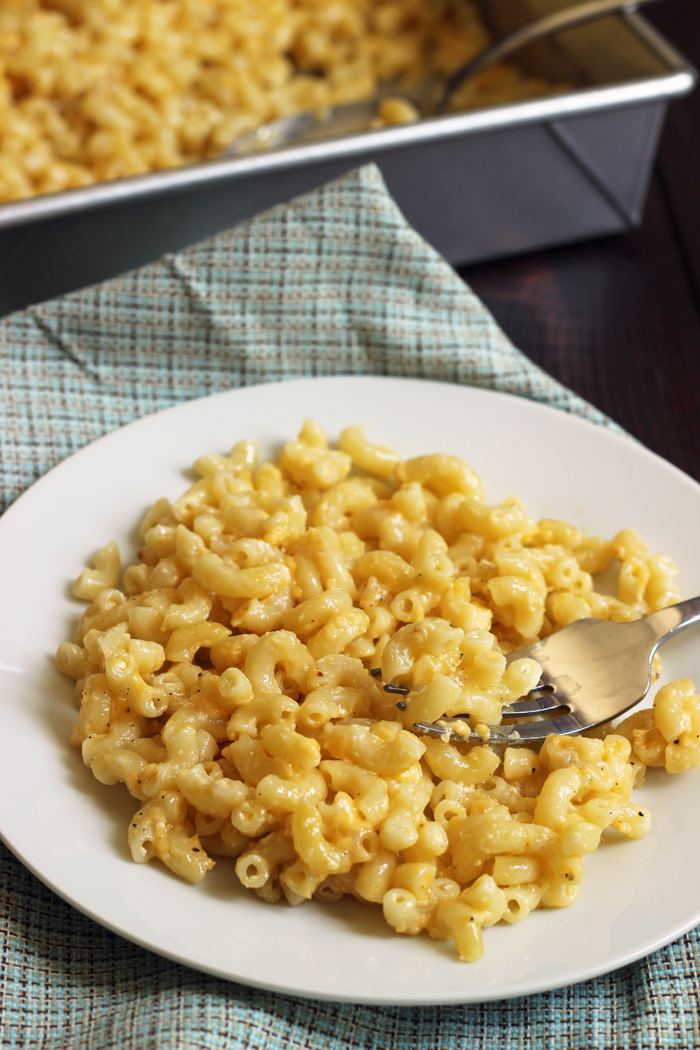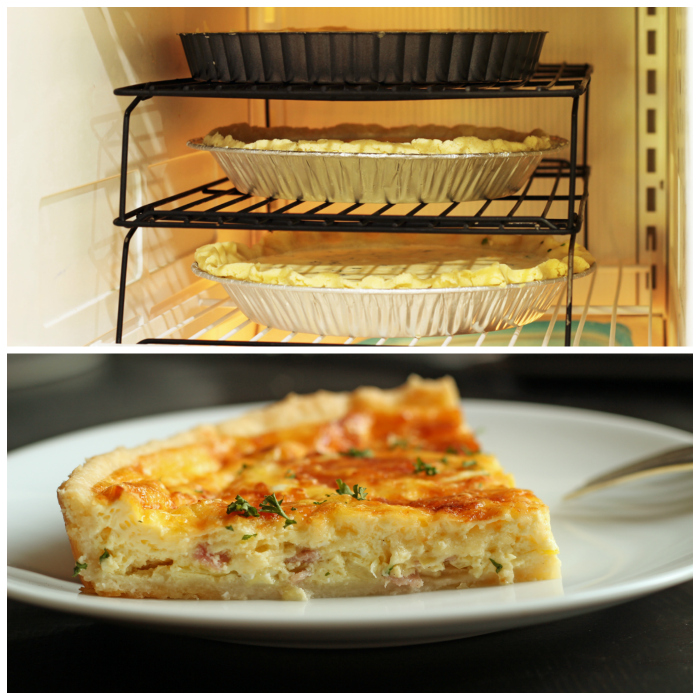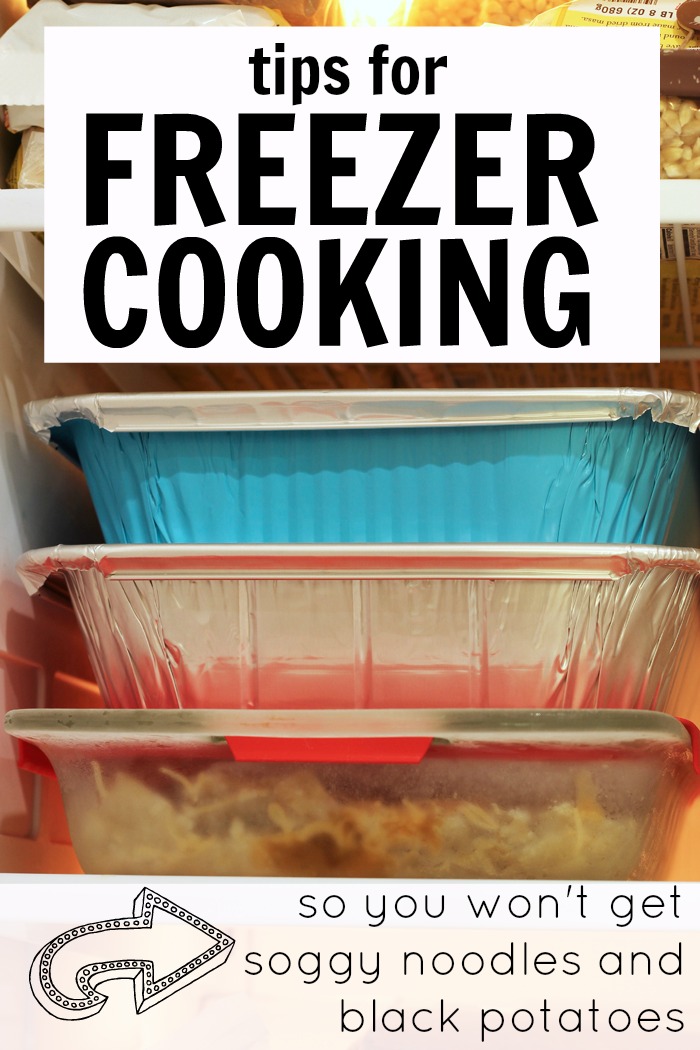Had a few disappointments cooking for the freezer? Follow these savvy tips for freezer cooking so you don’t get soggy noodles and black potatoes.
So, I’ve noticed a trend in the Pinteresty-freezer cooking realm. Folks share these beautiful photos: stacks of freezer meals in pretty little bags and tell you how quick and easy it is. It gets you jazzed. And then you buy all the ingredients for their recipes and spend the requisite hours to prepare the meals, only to find out upon preparation that the potatoes in the potato soup turn black or the vegetables in that crockpot dish are mushy beyond recognition.
As someone who preaches freezer cooking, I find this very frustrating and counter-productive to The Cause.
Maybe you’re one of those people who’s been turned off by freezer cooking because it doesn’t taste good or feels like a waste of time. Ugh. The very thought of eating food from the freezer turns you off. Maybe you followed all the directions and it blew up in your face. Maybe you made fifteen batches of potato soup and now have black potatoes.
This should not be!
I’m sorry that you were misled. Maybe those meals really work for that person on Pinterest or maybe they jumped the gun and posted before they fully tested their recipes. There’s always a reasonable possibility that no one purposely misled you.
On the other hand, let’s be honest. There’s a lot of crap masquerading on Pinterest as a viable idea. Could be that as well. Ahem.
I don’t want you to be sold a bill of goods, particularly of the frozen variety. So, today I present….
Tips for Freezer Cooking so You Don’t Get Soggy Noodles and Black Potatoes
I spent two years testing recipes for my freezer cookbook. I cooked more than I ate, and I still gained ten pounds. The freezer was packed to the gills at all times because I needed to know that food would taste just as good when thawed, reheated, baked, etc. as it did when it was freshly made.
And yes, we threw away food that year that was inedible. Not everything was a home run, or even a base hit, my husband’s grading system for recipes. (Fun fact: Only doubles or better make it into one of my cookbooks!)
I learned a lot about what you can and can’t freeze successfully during those two years. Unfortunately, I’ve seen a lot of that kind of stuff parading on Pinterest. I want to reach through my computer screen and cover your eyes from seeing some of that nonsense.
So, here are a few tips for freezer cooking that I hope you’ll keep in mind.
1. Potatoes must be cooked before frozen. (And some potatoes freeze better than others.)
The uncooked potatoes you find in the freezer section of your grocery store have been treated before freezing so that they’ll retain taste and texture. You can’t easily recreate this at home. Raw potatoes will turn black and gross.
It’s best to cook potatoes before freezing them, and even then to be selective about which kind of potatoes to use. Russets will work fine for mashed potatoes and twice baked potatoes. In some recipes, though, they get a little mealy and mushy. Waxy, red potatoes hold up better in soups and casseroles.
Use red potatoes whenever you can and always cook and cool them before freezing.

Want to save this post?
Enter your email below and get it sent straight to your inbox. Plus, I’ll send you budget recipes and money-saving tips every week!
2. Noodles should be cooked al dente, if at all.
Pasta dishes are some of my favorites to freeze because they’re cheap to make, kids love them, and they easily feed a crowd. However, keep in mind that noodles will get softer in the freezer. Trust me when I say you don’t want soggy noodles. Been there, done that.
If you’re preparing a baked noodle casserole, like Pesto Penne and Cheese or Easiest Mac and Cheese, make sure that you cook the noodles al dente. When I’m making lasagna for the freezer, I don’t even cook the noodles at all. You don’t to buy “no boil” lasagna noodles: I use regular noodles and abundant sauce and it works great.
3. Vegetables should be blanched or slightly pre-cooked before freezing.
With few exceptions, you should not freeze raw vegetables. I don’t care what you say about those “dump and go” crockpot meals, if you’re not precooking the vegetables slightly, their taste and texture will be off. Not to mention that vegetables cook much faster than meats, so the whole mess will be one bit pot o’ mush.
Freezing vegetables is a great strategy to stretch your dollar, avoid waste, and preserve your garden harvest. You can freeze onions, peppers, and mushrooms, uncooked. Just slice and open or flash freeze until firm so that you can package them and use only as much as you want.
Other vegetables, like broccoli, cauliflower, and carrots, need to be blanched or steamed for a short amount of time and then shocked in cold water and patted dry. This will help them retain taste and texture. A good guide for knowing what to do for each vegetable is the Ball Blue Book of Preserving.
Psst… Most of those crockpot “dump and go” meals are, well, a crock. I did some experimenting awhile back and found that the vegetables lost texture or the meat became really tough sitting in tomato sauce and similar sauces. I generally don’t recommend them.

4. You can freeze eggs, but not in all ways.
Freezing eggs to extend their shelf life is fine — if you remove them from the shell. Otherwise they explode. But, it depends on how you freeze them for them to taste good.
I once read about a lady who bought extra eggs on sale, cracked each one into a section of an ice cube tray, and then stored the egg cubes in a bag to use later. Eggs frozen this way should be good for baking, but not as whole or fried eggs. I know because I tried to prepare “baked eggs” in advance with the idea that you could thaw and bake, no problem. Yes, problem. Using frozen eggs as fried or baked eggs is not something I recommend.
Neither do I recommend freezing baked egg dishes. Every time I’ve done this, the texture has been off, similar to cafeteria eggs in college.
However, raw, beaten eggs frozen in a quiche do amazingly well. I freeze unbaked quiche, frittata, and other egg dishes all the time, so use your sale eggs that way!
5. Thawing before baking usually produces the best results.
There are lots of recipes out there boasting that you can “bake from frozen”. Proceed with caution. While there are some great freezer meals that you don’t have to thaw, many recipes do produce better results when you thaw them before baking.
Can you cook a Stouffer’s frozen lasagna or a TV dinner from frozen? Of course you can! But, I thought we were making freezer meals so that they tasted better than that jazz. Amiright? Yes, yes, I am.
Thaw your casserole overnight in the fridge before baking. The texture will be better, and you’ll have more accurate baking times, too.
Freezer cooking is an excellent way to save money and time, eat more healthfully, and get yourself a little ahead in your “life as Mom”. Unfortunately, there are a few simple things that if ignored can result in disappointed home cooks, disgruntled family members eating mediocre food, or both.
I hope these tips for freezer cooking help you to avoid soggy noodles and black potatoes.
6. Not all cheeses can be frozen.
You can freeze goat cheese very easily as well as freeze cheese that has already been shredded, but avoid freezing bricks of cheese that you plan to shred or slice later. Bricks as well as cheese slices will crumble upon thawing.



Ginnie
My biggest concern is freezing tomato based foods in disposable tin pans. I worry about the tomato sauce reacting and eating through the pan. Should I be concerned, and have you had any issues with that?
Jessica Fisher
I have not had an issue with that. There are loads of great glass dishes you can use if you’re concerned.
Brittnee
Oddly it wouldn’t let me reply to you directly but I made 2 different recipes one for a creamy pasta bake and 1 that was supposed to be chili Mac. I boiled the pasta until al dente. Both dishes looked to be saucy enough when I froze them but when we baked them/reheated they were both sooo dry like all the sauce was soaked up. How do I avoid this issue in the future?
Joan jacobson
Wondering about if a recipe calls for raw rice for a recipe that I want to freeze, should I add the raw rice or par cook before freezing?
Thanks
Jessica Fisher
Can you give me an example? It’s better for me to see the specific recipe.
Brittnee
I’ve made some freezer meals recently and when I take them out and 1/2 thaw them (because I forget to thaw earlier) the food is dry. When I put it in the pan it was very saucy and when I bake it its like there’s hardly any sauce at all. Do you have any suggestions for me.
I hate trying to add more sauce later.
Jessica Fisher
What is in the dish that could be absorbing the sauce? My guess is noodles. They continue to absorb liquid in the freezer. That’s why I often use uncooked or very al dente noodles for freezer casseroles. Can you give me some examples of these meals?
Brittnee
Oddly it wouldn’t let me reply to you directly but I made 2 different recipes one for a creamy pasta bake and 1 that was supposed to be chili Mac. I boiled the pasta until al dente. Both dishes looked to be saucy enough when I froze them but when we baked them/reheated they were both sooo dry like all the sauce was soaked up. How do I avoid this issue in the future?
Veronica
Have you tried using already frozen potatoes and vegetables to save a step? Or canned? I haven’t made freezer meals before but want to have some meals on hand before baby #2 arrives in May.
Jessica Fisher
Yes! That works fine. Move quickly so they don’t thaw, and make sure the other ingredients are cold as well.
Ro
Tks for helpful info. Things are getting a very dicy around here and I’m Seriously considering freezing meals. I’ve been reading on Pinterest, ehem, and common sense tells me that 95 percent of the recipes are way off when it comes to tossing everything in a freezer bag and next day dump it in a crock pot. Hello! I’m the type of cook who like to see and smell all ingredients getting happier as I sautee them, professionals call it ‘developing flavor’ so I appreciate your input in that respect. I ordered the book to get serious in this new way of cooking.
Jessica Fisher
Let me know if you need more help, Ro!
Lauren
Thank you! I had a friend give me some similar tips before I made mine since she had just done them a few months before…one I liked the most that seemed to help was that I freeze the Fruits/vegetables separately from the meat and marinades that are common in the ‘dump and go’ meals….I add the meat first and then the veggies only a couple hours before the time is up. I found it helps not overcook the veggies and avoid them get soggy! Hope that helps someone!
Jessica Fisher
Yes! Definitely a good strategy for slow cooker meals.
Chelsea
Does the same rule apply for sweet potatoes?
Jessica Fisher
In my experience the texture of sweet potatoes changes when frozen. It’s fine for mashed sweet potatoes but chunks tend to have a mealy mouth feel.
Patsy Hutchison
Here I was set, rather getting set, to do some crockpot dumping. Going to have to rethink some of these recipes that I printed. Years ago I made my own brown and serve rolls, doing that again now. Also, pancakes, mini meatloafs, and cookie dough. The cookies are for when the heat grandson wants his chocolate chip cookie.
Jessica Fisher
Good luck! Let me know how I can help.
Angie Tolley
Do you have any experience using gluten free noodles? I’m thinking, since they have a tendency to cook a little softer anyway to not cook them at all?
Jessica Fisher
I’m sorry. I’ve not done any freezer cooking with GF noodles, so I can’t be much help. Check with Lynn’s Kitchen Adventures. She’s great with that kind of thing.
Elizabeth
I’m so glad I found this today, right before grocery shopping for the freezer meals I want to stash away for when baby is born! And that macaroni and cheese looks awesome, definitely adding that to the list–thanks!
Jessica Fisher
Congrats on the new little one! 🙂
Ruth
I just found your page, and thank you for the ideas! I’m going to be having abdominal surgery in January, it’ll be a several inch long incision, and I fully expect to not be mobile enough to cook for myself for at least a week. My husband…..well, he follows directions well at least. But his cooking skills are limited to putting things in the oven and setting a timer. So I’ve been researching freeze ahead meals that I can make up and have ready to go. I REALLY don’t care for most casserole type dishes, so its been a challenge!
Jessica Fisher
Let me know how I can help. And best of everything with the surgery!
Ethel
I am glad I read your advice about frozen dump meals. I have been freezing some meals and was planning on trying the dump meals but think I will stick to cooked ones and quiches. Thanks so much!
Jessica Fisher
Let me know if you have any questions!